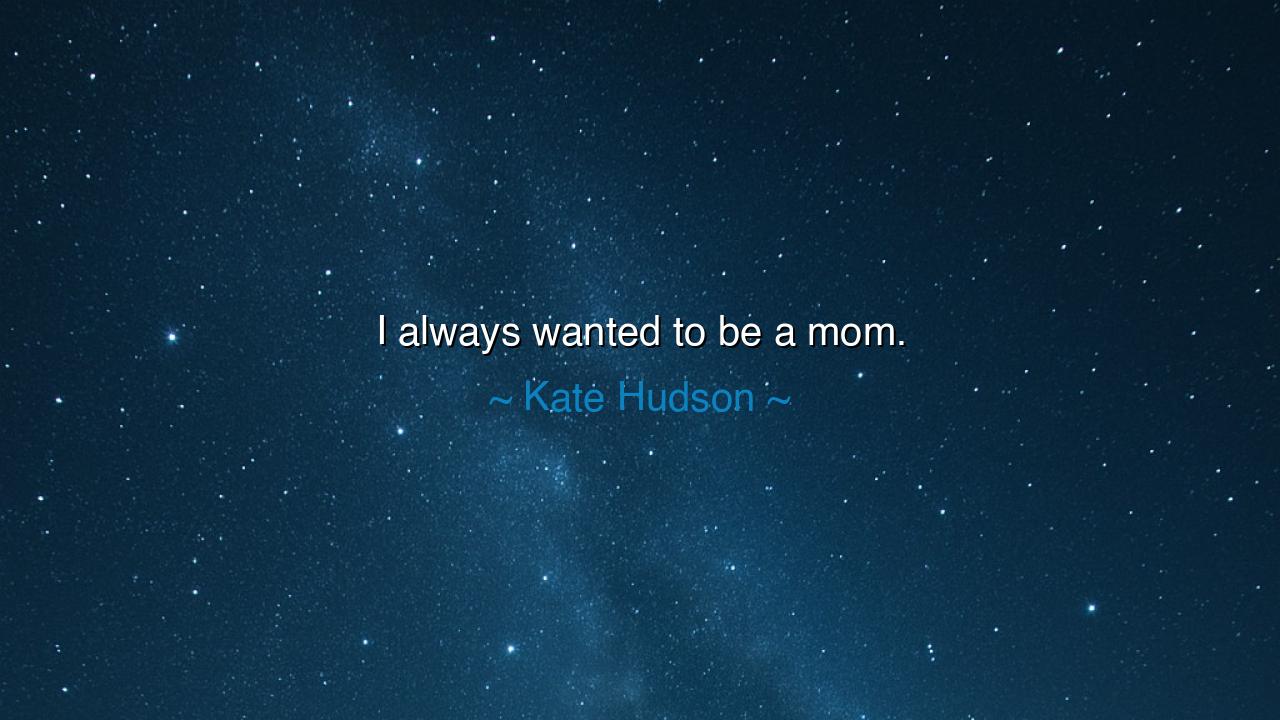
I always wanted to be a mom.






Hearken, children of reflection, to the words of Kate Hudson, who declares simply and profoundly: "I always wanted to be a mom." In these words lies a meditation upon desire, purpose, and the deep call of nurturing that resides within the human heart. Since the days of the ancients, philosophers and poets have recognized that the longing to give life, to guide, and to care for another is a sacred impulse, one that transcends culture and era, binding generations in the eternal rhythm of human continuity.
The ancients understood that motherhood is both vocation and virtue. Aristotle wrote that the household is the first school of ethics, where care, guidance, and moral example shape the young and cultivate the soul. Hudson’s declaration—that she always wanted this role—reflects the natural and enduring pull of this calling. To desire motherhood is to embrace a responsibility not merely of survival, but of love, education, and moral formation, a task that is both demanding and sublime.
Consider the life of Cornelia, mother of the Gracchi brothers, revered in Rome for her dedication and virtue. Though living in a time of political turbulence, Cornelia devoted herself to the moral and intellectual upbringing of her children, ensuring that their lives were guided by wisdom and integrity. Hudson’s longing echoes this timeless archetype: the aspiration to be a mom carries with it both the hope of shaping life and the courage to embrace responsibility.
The quote also illuminates the profound joy and fulfillment inherent in motherhood. To always want to be a mom is to align desire with purpose, to recognize that nurturing life is not merely a duty, but a calling that imbues existence with meaning. The ancients understood that fulfillment arises when one pursues what is deeply aligned with the soul’s nature, and Hudson’s words echo this principle: the longing to nurture and guide is as vital and noble as any pursuit of knowledge, honor, or artistry.
Furthermore, Hudson’s statement reflects the foresight and intention of embracing life deliberately. Unlike transient desires or fleeting ambitions, the wish to be a mom signifies a conscious acknowledgment of one’s capacity for love, patience, and guidance. Historical examples abound: Queen Olympias of Macedonia prepared meticulously for the upbringing of Alexander, understanding that the formation of character requires intention, foresight, and daily devotion, just as Hudson recognizes the profound responsibility of motherhood.
From this reflection emerges a timeless lesson: to understand and embrace one’s deepest calling is the path to fulfillment and meaning. Hudson teaches that the desire to be a mom is not merely biological or social, but moral and spiritual, encompassing love, guidance, and the shaping of the next generation. The yearning itself is a testament to the awareness of one’s role in the continuity and cultivation of life.
Practical actions flow naturally. Reflect upon your deepest callings and desires, aligning your efforts with purpose and integrity. Approach the task of nurturing—whether of children, students, or communities—with intentionality, patience, and love. Recognize that fulfilling such a calling requires both dedication and self-reflection, ensuring that your actions harmonize with your deepest values.
Remember, children of the ages, that the longing to nurture and guide is a sacred impulse, timeless and universal. Kate Hudson’s words illuminate the eternal truth that to always want to be a mom is to embrace one of life’s highest callings, a responsibility and privilege that shapes not only the child, but the very fabric of human continuity. In acknowledging and pursuing this desire, we cultivate love, wisdom, and enduring legacy across generations.






AAdministratorAdministrator
Welcome, honored guests. Please leave a comment, we will respond soon